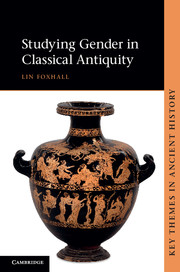Book contents
Chapter 1 - Gender and the study of classical antiquity
Published online by Cambridge University Press: 05 May 2013
Summary
INTRODUCTION
Once upon a time the history of the ancient classical world was primarily the story of great men and their battles. We have come a long way since then, with the realization that the inclusive concept of gender is one of the key principles upon which all societies are organized in some way and to some extent. Gender is now central to our understanding of antiquity, as it is to the world around us today. The past and the present are engaged in a complex conversation in this domain. Classical antiquity has long been evoked to justify specific constructions of gender in later times, and our modern and post-modern rediscovery of gender in the past has been stimulated in large part by revolutionary changes in our own society in the latter part of the twentieth and the twenty-first centuries.
In this chapter I will sketch out how the subject of gender in classical antiquity has been approached in the past, and why perspectives have changed. Most of these changes have occurred as gender has come to be understood in new ways and incorporated into new frameworks of social theory. Gender theory is a huge and complex topic, crossing a wide range of disciplinary domains, and it would be impossible to explore it here in depth. Instead, I will introduce this short history of approaches to gender in classical antiquity with an overview of why gender is so hard to study, to show why it demands a theoretical framework. I will then consider whether the study of gender, and gender in the past in particular, remains important today, and, if so, why.
- Type
- Chapter
- Information
- Studying Gender in Classical Antiquity , pp. 1 - 23Publisher: Cambridge University PressPrint publication year: 2013

